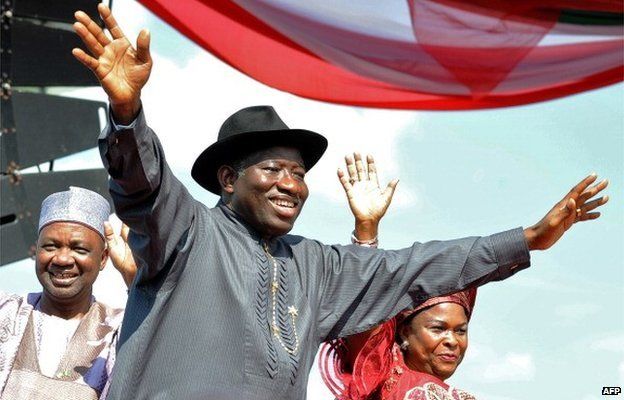Nigeria's Goodluck Jonathan, profile of a defeated president
-
Published

Defeated in his bid for re-election in the 28 March poll, Nigeria's Goodluck Jonathan had a rapid and highly improbable rise to power,
Until November 2009, he was serving out his time as a low-key deputy from the south of the country to a low-key president from the north.
But then, President Umaru Yar'Adua was taken to hospital in Saudi Arabia and was not seen again in public until he died on 5 May 2010.
Step forward, Mr Jonathan. After months of political wrangling, Nigeria's elite finally accepted him as acting leader in February 2010 when the ailing president returned home, but remained too ill to govern.
Barely 12 hours after Mr Yar'Adua's death, Mr Jonathan was sworn in as the new president and commander-in-chief of the armed forces of Africa's most populous nation - one of its most fractious democracies.
Not bad for a man who had never been elected to major public office in his own right.
'Super pastors'
He defied the governing People's Democratic Party's (PDP) tradition of alternating presidential power between north and south after two terms of office by winning the party's primaries.
In 2011, he won his first election - for president - despite opposition claims of fraud.
Goodluck Jonathan in focus:
- Has a penchant for fedora hats
- Regular church-goer
- Middle name, Ebele, means "God's wish"
- Fond of saying he never had shoes as a child because of poverty
- Told journalists in 2012 that he would not declare his assets because he did not "give a damn about it, even if you criticise me from heaven"
- Denied reports in 2014 that his net worth is about $100m (£62m)
Born in 1957 in the oil-rich Niger Delta region, Mr Jonathan is a Christian from the Ijaw ethnic group.
He is said to be extremely close to the "super pastors" of Nigeria's hugely popular Pentecostal churches.
His family's trade was canoe-making, but he studied zoology at university.
He worked as an education inspector, lecturer and environmental protection officer before going into politics in 1998.
Just as his rapid rise to power in the federal government owed a lot to luck, so too did his promotion to state governor.
Elected as deputy governor for his home state, Bayelsa, in 1999, he was once again serving his time without particular distinction.
Until, that is, his boss was impeached on corruption charges.
'Meteoric rise'
Mr Jonathan took over as governor and two years later was hand-picked by former President Olusegun Obasanjo to run on the PDP's ticket as vice-presidential candidate in 2007.
PDP insiders regarded him as a politician without a political base - and more of an administrator than a leader.
It had been suggested that Nigeria's many groups of powerbrokers agreed to let Mr Jonathan formally become acting president only because he was not seen as a threat.
But he threw his hat into the ring at the PDP primaries and with several central and northern states backing him, proved his political acumen.
"There has not been any rise that's been so meteoric in Nigeria," analyst Charles Dokubo said in 2010.
On the relevance of the acting president's name, he said: "What is luck? Luck is when you can take advantage of an opportunity. He was in the right place at the right time."
Journalist Ben Shemang is among the many Nigerians who believe Mr Jonathan's name had given him an advantage.
He told the BBC that Mr Jonathan was doubly lucky as his other given name was equally propitious - Ebele, which means "God's wish".
"That tells you that it was the wish of the parents for him to be successful," he said.
Amnesty
But Mr Jonathan's luck finally ran out when he lost the 28 March presidential election to Gen Muhammadu Buhari.
This has made him the first sitting president to be defeated in a Nigerian election.
Some analysts say this is not surprising. Mr Jonathan suffered a major blow in December 2013 when Mr Obasanjo, his former backer, called on him to step down.
In a widely circulated 18-page letter, Mr Obasanjo accused him of failing to deal with the many problems facing Nigeria - including an Islamist insurgency in the north-east, corruption, piracy, kidnapping and oil theft.
A powerful faction of PDP members, including state governors and MPs, also defected to the newly formed opposition All Progressives Congress (APC).
This paved the way for Mr Jonathan's defeat, as they rallied support for Gen Buhari.
But Mr Jonathan called him to congratulate him, confounding critics who thought he would not give up power.